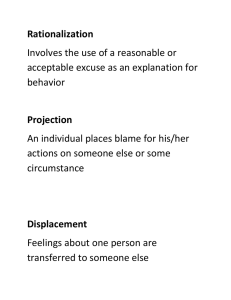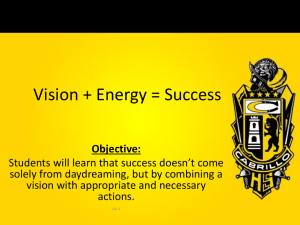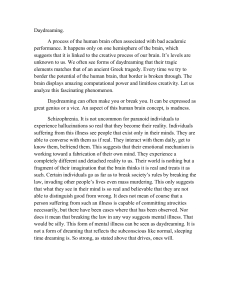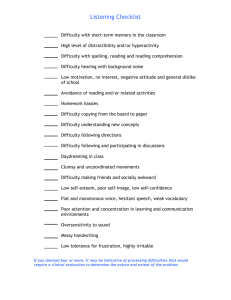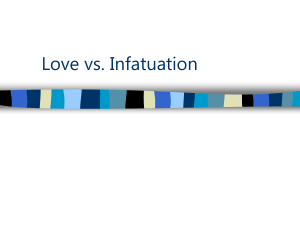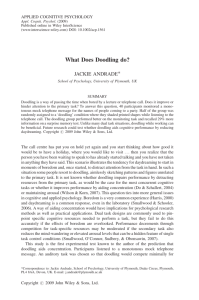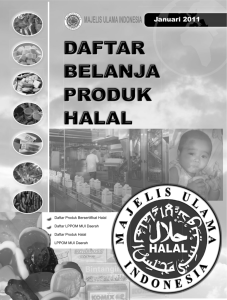DEFENSE MECHANISMS
advertisement
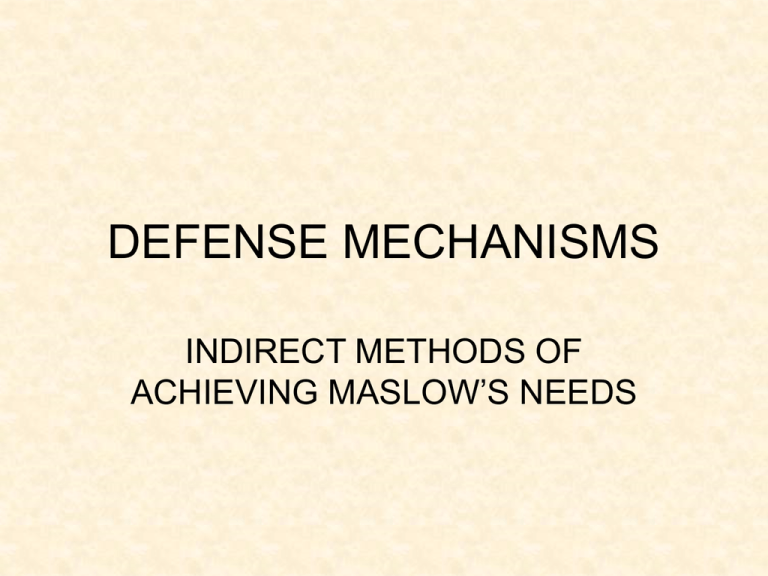
DEFENSE MECHANISMS INDIRECT METHODS OF ACHIEVING MASLOW’S NEEDS Defense Mechanisms • Unconscious Acts • Helps person deal with: – unpleasant situations or socially unacceptable behaviors Rationalization • Use of a reasonable excuse or acceptable explanation for behavior • In order to avoid the real reason or true motivation: • Example: Patient who fears lab test may say” I can’t take time off from work to do this” rather than admit fear Projection • Placing blame for one’s own actions or inadequacies on someone or else or circumstances-rather than accepting responsibility for their own actions. • Example: the teacher failed me because she doesn’t like me…rather than the actual reason…I didn't study/do the work etc. • When people use projection they avoid having to admit they made the mistake Displacement • Transfer of feelings about one person to another. • Can’t direct feelings toward the person responsible • Direct anger at coworkers or family (safe targets) • EX: Angry with boss, comes home and yells at the family Compensation • Substitution of one goal for another in order to achieve success • If the substituted goal meet the needs…this can be healthy • Ex: Person wants to be MD, no $, but becomes a Physicians Assistant. • Compensation can be efficient, IF the sub goal is met and productive Daydreaming • Means of Escape when one isn’t satisfied with reality • Can allow person to set goals for the future and set a course to meet the goals…then daydreaming is good • BUT…IF daydreaming is a substitute for REALITY..and dreams are more satisfying than reality…then daydreaming is bad • Example: Becoming a dentist: take action to achieve the goal-goal is met- daydreaming is positive • Becoming a dentist: taking no action- goal not met- daydreaming is negative Repression • Transfer of unacceptable or painful ideas, feelings and thoughts into the unconscious mind • Not aware this is occurring • When feelings or emotions become too painful or frightening for the person to deal with • Allows the person to function and “forget” the unpleasant fear or feeling • Can resurface in dreams, or affect behavior • Example: person terrified of heights-doesn’t know why Suppression • Similar to Repression except• Person is AWARE of the unacceptable feelings or thoughts and refuses to deal with them • Substitute work, hobby, or project to avoid a situation. • Example: man works late every night to avoid fighting with his wife Denial • Not a river in Egypt!!! • Disbelief of an event or idea too shocking to deal with • Occurs frequently during illness • When person is ready to deal then denial becomes acceptance • Example: "Sure, I have been drinking a bit too much lately, but it's only due to stresses at work; I don't really have a drinking problem since this is situational and not an inner weakness or something." Withdrawal • 2 main ways: cease to communicate or remove self physically from situation • Sometimes a satisfactory means of avoiding conflict • Example: silence, running away, and drinking and drug use. Malingering • To feign illness or other incapacity in order to avoid duty or work. • Example: feel “sick” stay home from school to avoid a test, but around 3:30 you get to feeling a lot better Sublimation • transformation of unwanted impulses into something less harmful and more socially acceptable • Example :A person with strong sexual urges becomes an artist. • A man who has extra-marital desires takes up household repairs when his wife is out of town. Intellectualization • intellectualization involves removing the emotion from emotional experiences, and discussing painful events in detached, uncaring, sterile ways. • Example: a family member close to you becomes terminally ill, you engross yourself in the study of the disease in order to avoid dealing with the emotions of the situation
